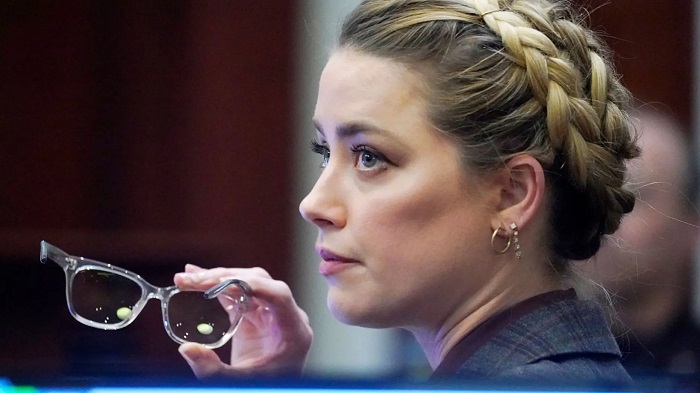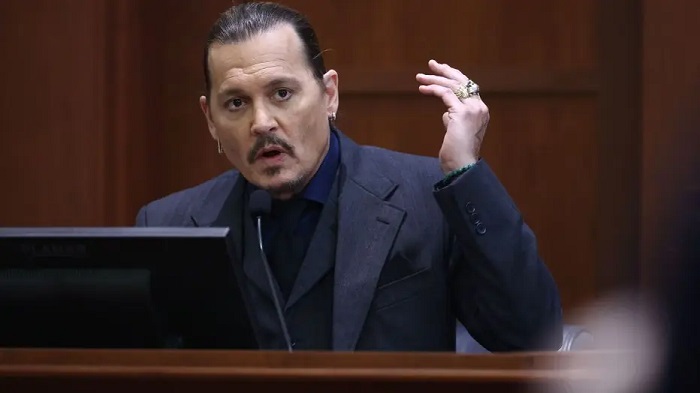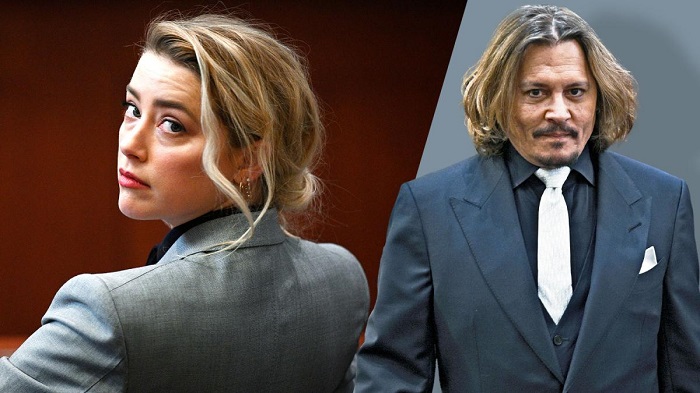- Defamation Lawsuit Against Amber Heard
- Role of Domestic Violence in This Case
- Defamation Under the Law in Virginia
- Defamation Per Se
- Actual Malice and Negligence
- Legal Defenses to Defamation
- What Makes This Case so Complicated?
- Virginia Jury Decision
- Amber Heard’s Appeal and Settlement
- Professional Impact and life after the trial
The defamation trial between the ex-spouse Johnny Depp and Amber Heard began in April 2022, when the actor filed a lawsuit against his ex-wife regarding the actress’s allegation against him back in 2018.
This trial has exceptional media coverage due to the popularity of the Hollywood stars and the complex background, along with the events that preceded this case. The trial was the second lawsuit involving abuse allegations connected to Johnny Depp and Amber Heard’s relationship, following a trial in the UK in 2020.
Defamation Lawsuit Against Amber Heard
Johnny Depp filed a defamation lawsuit against Amber Heard for $50$ million in March 2019, related to the published article by the actress in Washington Post. In the article, Amber Heard discussed the treatment of women in sexual assault cases and referred to herself as a “public figure representing domestic abuse”. While she did not mention her ex-husband Johnny Depp directly; however, he was dropped from his role in Disney’s Pirates of the Caribbean franchise just a few days after the article was published. He claims the article caused damage to his professional career as an actor.
In the opening statement, Depp’s lawyers said that Heard wrongfully “presented herself as the face of the Me Too movement — the virtuous representative of innocent women across the country and the world who has truly suffered abuse” and that her “false allegations had a consequential impact on Mr. Depp’s family and his ability to work in the profession he loved.”
In 2020, Johnny Depp sued The Sun’s publisher for libel over a headline where he was called a “wife-beater.” Amber Heard testified in the trial, making 14 allegations of abuse against Johnny Depp. Even though Depp denied all of them, the judge decided that 12 had been proven to the civil standard and that The Sun’s headline was “substantially true.”
After losing this case, Amber Heard’s lawyers tried to get Depp’s defamation lawsuit dismissed. However, the judge refused, referring to differences in UK and US defamation laws and pointing out that Amber Heard was not a defendant in the case against The Sun.
Further, The Washington Post’s printing presses and online servers were in Virginia itself, providing the jurisdiction with the required authority to proceed with the matter. Afterwards, Heard filed a $100 million countersuit against Johnny Depp, claiming she was defamed when his legal team referred to her claims as “fake” and a “sexual violence hoax.”
Role of Domestic Violence in This Case
According to the National Statistics Domestic Violence Fact Sheet, one in three women and one in four men have experienced domestic violence, including slapping, shoving, and pushing.
For more severe physical assaults, one in seven women and one in 25 men have experienced abuse that resulted in injuries. When one or both partners physically attack the other, it creates a toxic environment that can be destructive. Over 4,000 women die each year due to domestic violence. Prosecutors often have a hard time pursuing domestic violence cases because victims aren’t willing to testify against the abuser and will not tell the truth about how they were injured.
According to Heard, Johnny Depp routinely became explosively angry and physically violent throughout their relationship. Heard and her lawyers said she was subjected to “excessive” emotional, verbal and physical abuse during the “entirety” of the couple’s 15-month marriage. Her filings framed the iPhone incident as a repeat event, alleging that Depp subjected her to “excessive emotional, verbal and physical abuse” and “angry, hostile, humiliating and threatening assaults.”

However, the police officer, who was called to Amber Heard and Johnny Depp’s penthouse after a fight, testified that she did not identify the actress as a victim of domestic violence at the time, adding that she did not see any evidence of a crime, including broken glass or mess in the penthouse. Johnny Depp denied the allegation and was not charged with any crime.
Therefore, he testified that the couple frequently argued but said, “Never did I reach the point of striking Ms. Heard in any way nor have I ever struck any woman in my life.” Furthermore, during his testimony in the defamation case trial against his ex-wife, he explained that he was often physically assaulted by her. According to him, he was the actual victim of domestic violence in their marriage.
This case urges further discussion about intimate partner violence, most commonly referred to as domestic abuse. Motivations for intimate partner violence in men and women are not significantly different.
Research by The National Library of Medicine shows that men and women who have committed intimate partner violence have similar reasons, such as control, revenge, anger, or jealousy. The evidence shown in the Depp v. Heard trial supports the possibility that both Depp and Heard were abusive during their relationship.
Defamation Under the Law in Virginia
According to the Law in Virginia, defamation is the general term for a legal claim involving injury to one’s reputation caused by a false statement of fact. It includes both libel (defamation in written or fixed form) and slander (spoken defamation). The crux of a defamation claim is falsity.
Truthful statements that harm another’s reputation will not create liability for defamation. To state a claim for defamation under Virginia law, a plaintiff must show publication of an actionable statement with the requisite intent. To be actionable, the statement must not only be false but defamatory, i.e. it must ‘tend so to harm the reputation of another as to lower him in the estimation of the society or to deter third persons from associating or dealing with him.
Thus, to successfully prevail on a defamation claim, a plaintiff must prove all of these elements. Stated differently, “merely offensive or unpleasant statements” are not defamatory.; rather, defamatory statements “make the plaintiff appear infamous or ridiculous. Furthermore, in Virginia, the statute of limitations is 1-year for defamation. Code of Virginia § 8.01-247.1 states, “Every action for injury resulting from libel, slander, insulting words or defamation shall be brought within one year after the cause of action accrued.
Defamation Per Se
Virginia recognizes that particular statements constitute defamation per se. These statements are so atrocious that they will constantly be considered defamatory and are assumed to harm the plaintiff’s reputation without further proving that harm. In Virginia, a statement that does any of the following things amounts to defamation per se:
- attributes to the plaintiff the commission of some criminal offence involving moral turpitude, for which the party, if the charge is true, may be indicted and punished;
- indicates that the plaintiff is infected with a contagious disease;
- attributes to the plaintiff’s unfitness to perform the duties of an office or employment of profit, or lack of integrity in the discharge of the duties of such an office or employment; or
- hurts the plaintiff in their profession or trade.
Actual Malice and Negligence
Legal liability often requires, in addition to a bad act, a bad intent or state of mind; defamation is no different. A person cannot be held liable for publishing a false and defamatory statement alone.; Rather, depending on the nature of the statement and its subject, the publisher must have known that the statement was false or acted recklessly or negligently in failing to determine the falsity of the statement.
In the 1964 decision of New York Times Co. v. Sullivan, the United States Supreme Court held that the freedom of speech protections in the First Amendment to the US Constitution requires a stricter standard with respect to statements about public officials. The doctrine of the Sullivan case, which dealt with public officials, was expanded over the years to include all public figures.
Post-Sullivan, such defamation claims can only succeed if the defendant published the statement with “actual malice,” which means that the defendant either knew the statement was false or acted with reckless disregard as to whether or not it was true. This is typically a difficult standard to meet and, practically speaking, often prevents public figures from pursuing defamation claims. Public officials, all-purpose public figures, and limited-purpose public figures must prove that the defendant acted with actual malice, i.e., knowing that the statements were false or recklessly disregarding their falsity.
Virginia courts apply a negligence standard to defamation claims brought by private figures seeking compensatory damages when the allegedly defamatory statement does substantial harm to the reputation apparent. The actual malice standard applies in cases brought by private figures where the substantial danger to reputation is not apparent.
However, if defamatory statements regard matters of public concern, even private figures must show actual malice to be awarded presumed or punitive damages. In effect, this makes defamation cases regarding matters of public concern more of a challenge to pursue, as compensatory damages, the actual loss that can be directly attributed to the defamatory statement, are usually difficult to establish.
Legal Defenses to Defamation

Virginia courts recognize several privileges and defences in the context of defamation actions, including substantial truth, the opinion and fair comment privileges, and the fair report privilege.
If the statements do not meet the definition set out above, a claim may also be rejected if the statement is privileged and the privilege is not abused. There are two types of privilege: absolute and qualified. Absolute privilege exists only in narrow cases: legislative statements, judicial proceedings, certain executive functions, certain statements among military officers, and statements to spouses. If the defendant has a privilege defence, the defendant probably has a qualified privilege. The nature of qualified privilege is broad.
The Virginia Supreme Court described it by stating: It extends to all communications made bona fide upon any subject matter in which the party communicating has an interest, or in reference to which he has a duty to a person having a corresponding interest or duty, and the privilege embraces cases where the privilege is not a legal one, but where it is of a moral or social character of imperfect obligation.
However, even if a privilege applies, the defendant is still liable if the defendant abused the privilege and the plaintiff proves by clear and convincing evidence that:
- defendant knew the statement was false or made it with reckless disregard of whether it was false or not; or
- the statement was deliberately made in such a way that it was heard by persons having no interest or duty in the subject of the statement; or
- the statement was unnecessarily insulting; or
- the language used was stronger or more violent than was necessary under the circumstances; or
- the statement was made because of hatred, ill will, or a desire to hurt the plaintiff rather than as a fair comment on the subject; or
- the statement was made because of personal spite or ill will, independent of the occasion the communication was made.
What Makes This Case so Complicated?
Defamation cases can often be difficult to prove, especially when parties are public figures, which is the situation in this case. Moreover, the events that preceded this lawsuit make the case even more complicated and hard to prove. The element of domestic violence plays an important role in the whole case; both parties claimed that they had been victims of domestic violence during their relationship.
Therefore, the essential thing for Johnny Depp was to prove that the allegations made against him were false and damaged his professional career as an actor, while for the other party, it was important to prove that there was abuse against Amber Heard during their relationship.
Virginia Jury Decision
On June 1, 2022, the Virginia jury provided their decision for the controversial case. An overwhelming majority of the jury sided with Johnny Depp in the defamation trial. The final decision asked Amber Heard to pay $10 million in compensatory damages and $5 million in punitive damages to Johnny Depp. On the other hand, Amber Heard was awarded $2 million as compensatory damages and no punitive damages.
However, considering that the total punitive damages capable of being awarded were capped at $350,000 in the Virginia law, Depp received a total of $10.35 million as damages.
While Amber Heard expressed her disappointment towards the decision, along with calling it a setback for other women victims, Johnny Depp expressed how he got his “life back” after the decision.
Amber Heard’s Appeal and Settlement
On July 21, 2022, Amber Heard filed a notice of appeal. This was followed by Johnny Depp filing a notice of appeal on July 22, 2022. Depp’s spokesperson expressed that even though it was time for both parties to move forward with their lives since Amber Heard was determined to pursue the matter further, “a concurrent appeal to ensure that the full record and all relevant legal issues be considered by the Court of Appeal.”
Eventually, on December 19, 2022, Amber Heard announced her decision to settle the defamation case by saying, “I make this decision having lost faith in the American legal system, where my unprotected testimony served as entertainment and social media fodder”.
Johnny Depp’s team issued a statement stating, “We are pleased to formally close the door on this painful chapter for Depp, who made clear throughout this process that his priority was bringing the truth to light. The jury’s unanimous decision and the resulting judgement in Depp’s favour against Heard remain fully in place.”
Professional Impact and life after the trial
Considering the televised nature of the trial, it greatly impacted the lives of Johnny Depp and Amber Heard.
Johnny Depp managed to gain a tremendous fandom during the trial, which continued in his journey post the trial as well. He became the first man to star in Rihanna’s Savage X Fenty runway show and further went on to sign a multimillion-dollar deal with Dior Homme. Further, he is expected to make a comeback to Hollywood through his movie titled “Jeanne du Barry”, wherein he is expected to play the role of King Louis XV.
On the other hand, even though an overwhelming number of people had petitioned for Amber Heard to be kicked out from the Aquaman sequel, Amber Heard is soon expected to reprise her role as Mera in the Aquaman sequel, as well as in the Lost Kingdom. However, her role is said to have been reduced significantly. Amber Heard is also expected to star in a new movie titled “In the Fire”, a period drama by Conor Allyn.
When it comes to the entire scandal in general, the Johnny v. Amber documentary has already aired on Hulu in 2022. Considering the controversial nature of the entire trial, a TV show or a book is expected to follow as well.
The trial has been a rollercoaster ride, not only for Johnny Depp and Amber Heard but also for all the followers. However, all set and done, it is now the time to move forward.




